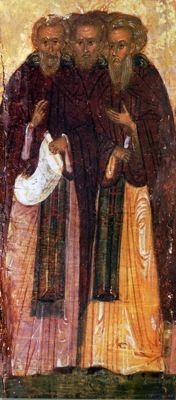John, Sergius, Patrick, and others, slain at the Monastery of St.Sabbas, martyrs, venerable
Dates of commemoration
Life
Saints John, Sergius, Patrick and others were slain in the Monastery of Saint Sabbas. During the eighth century the area around Jerusalem was subjected to frequent incursions of the Saracens. The monastery of Saint Chariton was devastated and fell into ruin. Twice the Saracens tried to plunder the Lavra of Saint Sava the Sanctified, but God’s Providence protected the monastery. The monks would have been able to escape the barbarians by going to Jerusalem, but they decided not to forsake the place where they had sought salvation for so many years.
On March 13, the Saracens broke into the monastery and demanded all the valuables. The monks told them that there was nothing in the monastery but a meager supply of food and old clothing. Then the Saracens began to shoot arrows at the monks.
Thirteen men were killed and many wounded, and monastery cells were set afire. The Saracens intended also to torch the monastery church, but seeing a throng of people in the distance, they mistook this for an army sent from Jerusalem. The Saracens managed to get away, carrying off the little they were able to plunder. After the enemy fled, Father Thomas, an experienced physician, began to help those who remained alive.
On Great Thursday, March 20, the Saracens again descended upon the Lavra with a larger force and began to beat up the monks. The survivors were driven into the church, where they were tortured in order to force them to reveal where any treasure might be hidden. The monastery was surrounded, so no one could save himself by fleeing. The barbarians seized Saint John, a young monk, who had cared for vagrants. They beat him fiercely, then they cut the sinews of his hands and feet and dragged him over stones by his feet, which tore the skin from the martyr’s back.
The keeper of the church vessels, Saint Sergius, hid the church vessels and attempted to flee, but he was captured and beheaded. Several of the monks nevertheless managed to hide themselves outside the monastery in a cave, but they were spotted by a sentry on a hill, and they ordered everyone to come out. Inside the cave Saint Patrick whispered to the brethren huddled with him, “Fear not, I will go alone and meet my death. Meanwhile, sit and pray.”
The Saracens asked whether there was anyone else in the cave, and Patrick said that he was alone. They led him to the Lavra, where the captives awaited their fate. The Saracens demanded of them a ransom of 4,000 gold pieces and the sacred vessels. The monks were not able to give such a ransom. Then they led them into the cave of Saint Sava inside the monastery walls. They lit a fire on which they piled up dung in front of the entrance to the cave, hoping to suffocate the monks with the poisonous fumes. Eighteen men perished in the cave, among whom were Saints John and Patrick. The Saracens continued to torture those who were still alive, but got nothing out of them. Finally, they left the monastery.
Later, on the night of Great Friday, the monks hidden in the hills returned to the Lavra, they took up the bodies of the murdered Fathers to the church and buried them there.
The barbarians who plundered the monastery were punished by God. They were stricken with a sudden illness, and they all perished. Their bodies were devoured by wild beasts.
The martyrs of Saint Sava’s Lavra commemorated on May 16 suffered in the seventh century, during the reign of Heraclius (610-641).
Source:
Holy relic type
unless specified otherwise below, "holy relic" means a fragment of a bone of the saint
Holy relic
Location of the holy relic in the Cathedral:
North kliros, reliquary #2
Troparion
Tone 4
As chosen and holy lambs of the Savior, / you were gathered together in wise Sabbas’ flock from many lands. / You were put to death by the cruelty of the barbarians / and you departed joyfully to the heavenly fold. / As righteous athletes you now pray for our souls.
Kontakion
Tone 4
You openly disdained the pleasure of earthly and corruptible things, / choosing instead a life in the desert. / You despised the beautiful things of this world / together with the food that passes away. / Therefore, all-blessed ones, you were counted worthy of the Kingdom of heaven, / where you rejoice with the choirs of martyrs and ascetics. / As we honor your memory, / we earnestly cry out to you: / deliver us, O Fathers, from tribulations!






